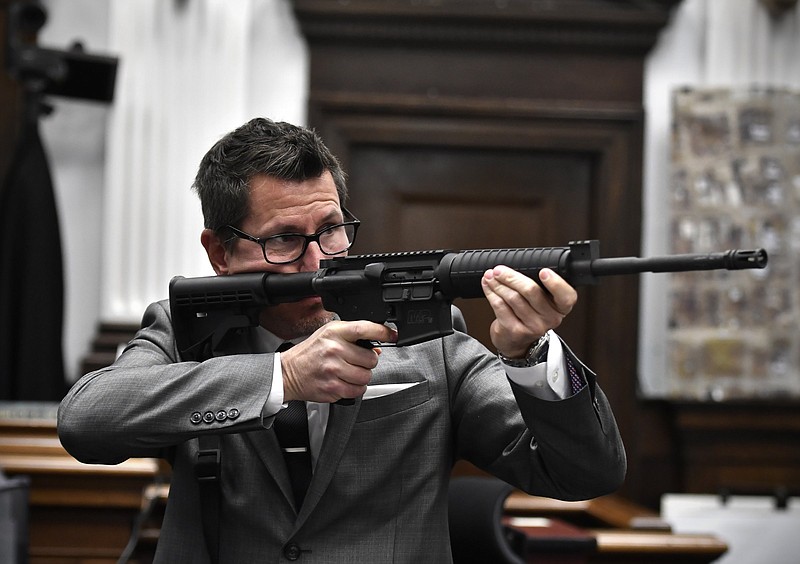KENOSHA, Wis. -- Kyle Rittenhouse provoked bloodshed on the streets of Kenosha by bringing a semi-automatic rifle to a protest and menacing others, and when the shooting stopped, he walked off like a "hero in a Western," a prosecutor said in closing arguments Monday at Rittenhouse's murder trial.
But Rittenhouse's lawyer countered that the shooting started after the young man was ambushed by a "crazy person" that night and feared his gun was going to be wrested away and used to kill him. Defense attorney Mark Richards said Rittenhouse acted in self-defense.
Rittenhouse, then 17, fatally shot two men and wounded a third during a night of protests after the summer 2020 police shooting of Jacob Blake.
He said he went to Kenosha from his home in Antioch, Ill., to protect property from rioters in the days after Blake, a Black man, was shot by a white Kenosha police officer. Rittenhouse, a former police youth cadet, is white, as were those he shot.
In closing arguments, prosecutor Thomas Binger said Rittenhouse was a "wannabe soldier" and was "looking for trouble that night." Binger repeatedly showed the jury drone video that he said depicted Rittenhouse pointing the AR-style weapon at demonstrators.
"This is the provocation. This is what starts this incident," the prosecutor declared.
He told the jury: "You lose the right to self-defense when you're the one who brought the gun, when you are the one creating the danger, when you're the one provoking other people."
Rittenhouse, now 18, faces a mandatory sentence of life in prison if convicted of the most serious charge against him, first-degree intentional homicide, which is Wisconsin's top murder charge.
Binger zeroed in on the killing of 36-year-old Joseph Rosenbaum, who was the first man gunned down that night and whose shooting set in motion the ones that followed. The prosecutor repeatedly called it murder, saying it was unjustified.
"I think we can also agree that we shouldn't have 17-year-olds running around our streets with AR-15s, because this is exactly what happens," Binger said.
In his own closing argument, Richards, the defense attorney, called Rosenbaum a "crazy person" who was "hell-bent on causing trouble that night" and went after Rittenhouse unprovoked.
"Mr. Rosenbaum was shot because he was chasing my client and going to kill him, take his gun and carry out the threats he made," Richards said, adding that Rittenhouse never pointed his gun before being chased: "It didn't happen."
Richards said an enlarged image that prosecutors said shows Rittenhouse pointing his gun at protesters is "hocus pocus" that doesn't prove anything.
After killing Rosenbaum, Rittenhouse shot and killed Anthony Huber, 26, and wounded Gaige Grosskreutz, 28, while trying to make his way through the crowd. Rittenhouse testified that Huber hit him with a skateboard and that Grosskreutz came at him with a gun of his own -- an account largely corroborated by video and Grosskreutz himself.
But the prosecutor said Rittenhouse provoked that bloodshed, too. He said Huber, Grosskreutz and others in the crowd were trying to stop what they believed was an active shooter.
When it was all over, Rittenhouse walked away like a "hero in a Western -- without a care in the world for anything he's just done," Binger said.
The defense, though, said Rittenhouse was set upon by a "mob." Richards accused prosecutors of using the term "active shooter" for Rittenhouse because of "the loaded connotations of that word."
And in an apparent reference to the police shooting of a Black man that touched off the protests, Richards said: "Other people in this community have shot people seven times and it's been found to be OK."
No charges were brought against the white officer.
The sound of a small group of protesters chanting outside the building could be heard at one point during the defense closing, but it wasn't clear from inside the courtroom what they were saying or whether the jury heard them.
Supporters have hailed Rittenhouse as a hero who took a stand against lawlessness. Foes have branded him a vigilante.
Binger began his closing arguments by questioning whether Rittenhouse was genuinely trying to help.
The prosecutor noted that Rittenhouse had ammunition capable of traveling the length of five football fields and passing through cars, and asked the jury: "Why do you need 30 rounds of full metal jacket [of ammo] to protect a building?"
[Video not showing up above? Click here to watch » arkansasonline.com/1116shootings/]
But Richards said Rittenhouse, who worked as a lifeguard in Kenosha and helped clean up graffiti before the shootings, "feels for this community" and "came down here trying to help, to see the damage."
After closing arguments, names were to be drawn to determine which 12 of the 18 jurors who heard testimony would deliberate, with the rest dismissed as alternates.
With a verdict near, Gov. Tony Evers said that 500 National Guard members would be prepared for duty in Kenosha if local law enforcement requested them.
Information for this article was contributed by Tammy Webber of The Associated Press.

